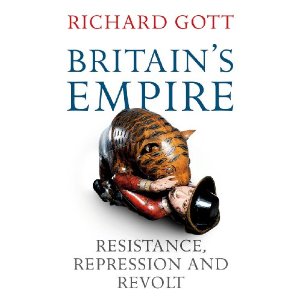
Britain's Empire: Resistance, Repression and Revolt by Richard Gott – review
The violence at the heart of colonialism is exposed in Richard Gott's history
Richard Drayton
Guardian, 7 December 2011
Amazon Page for Reviewer's Book Nature's Government
“We insisted on reserving the right to bomb niggers.” So David Lloyd George explained the British government's demand at the 1932 World Disarmament Conference to keep the right to bomb for “police purposes in outlying places”. Airpower had shown its value in spreading what Winston Churchill, when defending in 1919 the use of poison gas against “uncivilised tribes”, had called “a lively terror”. Richard Gott shows how a hundred years earlier more hands-on means were used to similar ends: the heads of rebel slaves in Demerara in 1823 and Jamaica in 1831 were cut from their bodies and placed on poles beside the roads. The mutilation of the corpses of the defeated never quite goes out of fashion.

Empires have always depended on violence. Killing, torture and the destruction of property are essential to those tasks of destroying resistance, extracting information and collaboration, and demonstrating dominance that underly all conquest. But it is the privilege of conquerors to tell stories that flatter their own past. It is, thus, rare to find the historians of any imperial power describing the ugly business of the frontier as more than unfortunate exceptions to an otherwise honourable enterprise. Britain is no exception: from the Victorians until the 1950s, its historians mainly saw in the British empire a great engine for diffusing liberty and civilisation to the world. If such Whig piety declined in the era after Suez, later scholars, studying particular places and times, never connected all the episodes of massacres, rebellions and atrocities. Popular historians continued profitably to sell happy stories of the empire to the British public – always marketed as daring revisionist accounts.
Gott's achievement is to show, as no historian has done before, that violence was a central, constant and ubiquitous part of the making and keeping of the British empire.
. . . . . . .
What Gott loses by this focus on resistance, however, is any subtlety in understanding the meanings of collaboration. He repeatedly imposes the lens of 20th-century nationalism, and even anti-fascism, so that those who did not rebel become traitors or “fifth columnists”. He does not examine with care or sympathy the varieties of loyalism, and the motives and experiences of those who chose, however mistakenly, to throw in their lot with the British. Neither does he explore how the economic and technological bases of British power changed between 1750 and 1850. For the revolution that science and industry brought to production, transport, communication and war made Britain able to attract and to extort indigenous collaboration more easily, and changed how the British understood themselves as a nation and their rights in the wider world. The empire was made by more than violence.
See Also:
Worth a Look: Book Reviews on Class War (Global)
Worth a Look: Book Reviews on Corporate & Transnational Crime
Worth a Look: Book Reviews on Empire as Cancer Including Betrayal & Deceit





